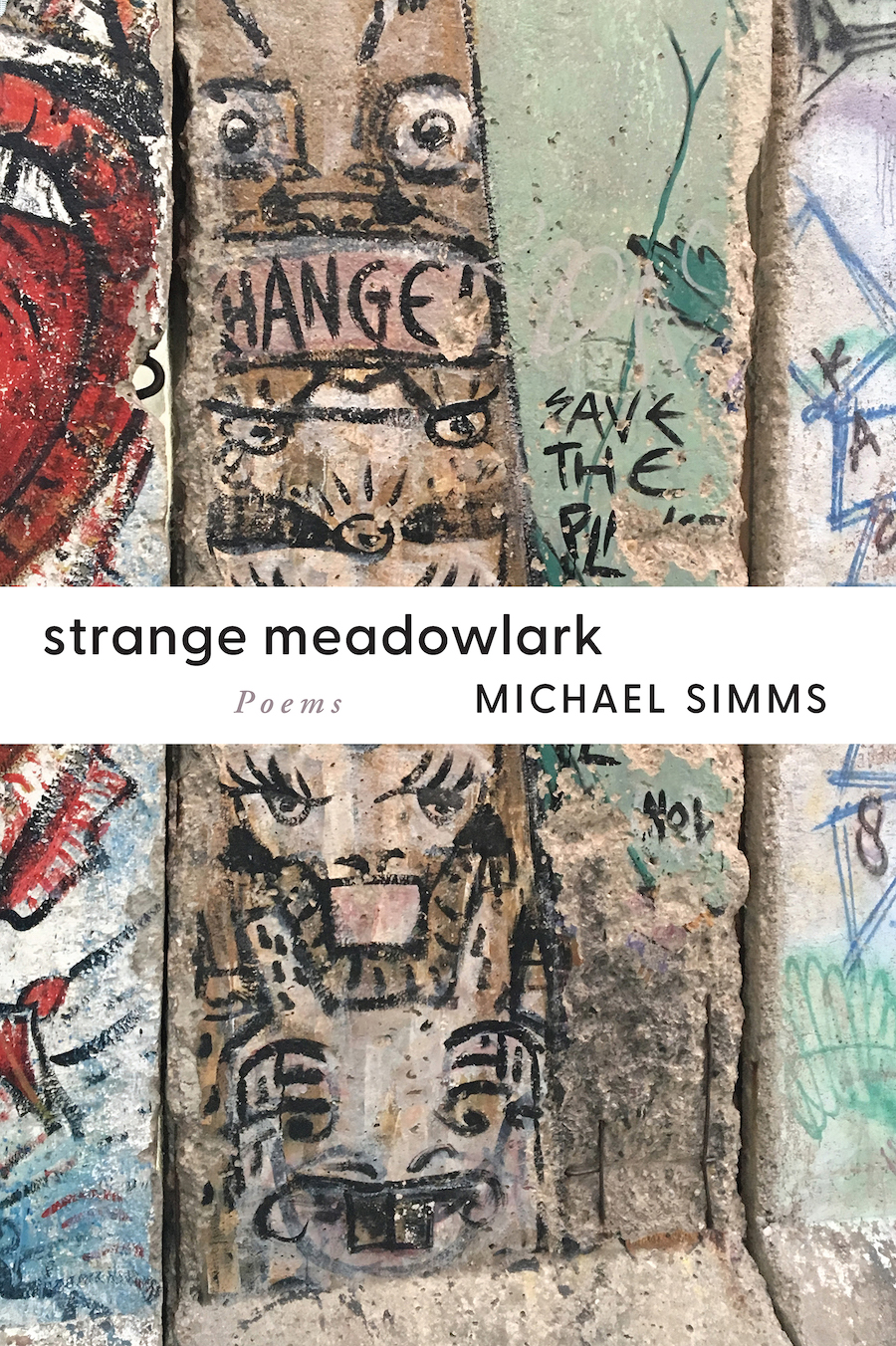You won’t find Michael Simms’s fourth full-length collection of poetry—or any of his books—in the public library in his hometown of Llano, Texas. Llano, 65 miles northwest of Austin, was built along the Llano River, a place of great natural beauty. This little county seat is the unofficial deer capital of Texas, and also home to animals and birds such as quail, dove, turkey, feral pig, and during the winter migration season, bald eagle. Referenced repeatedly in Strange Meadowlark, Llano nurtured the poet’s appreciation of nature, as demonstrated by its opening poem, “The Artist’s Garden at Giverny,” in which Simms—in short, deceptively direct stanzas that evoke William Carlos Williams—contrasts his own “small” Pittsburgh garden with the splendor of Monet’s Giverny, as well as the gardens of his past:
…Years ago
I folded compost
into the soil
to build an opulent layer
over the dark
clay of the mountain
I terraced the earth
with stone
as I did in my father’s garden
decades ago / Now
at the end of what I thought
I knew
white-tail graze the roses…
For the soil of Llano contains other things that compel the poet, in his sixty-eighth year of a life that for 35 years he has spent as editor and writer, husband and father, tender of home, garden, and animals, “to build an opulent layer / over the dark.” These include the harsh evangelical Christianity of “my people,” the abysses of child abuse and rape, criminality and addiction, mental illness and death, and Strange Meadowlark’s tragic leitmotif: the suicide of the author’s sister, Elizabeth, and the grief and guilt that flow like a river from that terrible loss. In “Odysseus in Hell,” Simms frames his American narrative—by turns conversational and confessional, punctuated with moments of lyric grace—by using the hero’s quest in The Odyssey:
…My people believe
you can be saved
if you ask
and what saved me years ago
from the hell of that house
was poetry / strange
angel that it was
[…]
Wandering
through the underworld
our sly but unwise hero
stumbles across his mother
who asks why
he’s come still alive to this place of shadow
He recounts his failure
to return home / Then he asks
how she died and she tells him
she died of grief
for him
My mother died of grief
as well / Oh Lord
my sister blew her brains out
in a bathroom in Llano, Texas
while her parents sat on the front porch
enjoying the morning light
Like the ghosts of the ancient Underworld, Elizabeth returns to the poet as a tangible presence. “You Visit Me More Often Now That You’re Dead” begins as a dream and ends as a vision:
…now you come at night
when I wake from
long bike rides through
back roads of cane fields
in the bright sun
[…]
…the pretty blonde
gliding by smiling
in the beautiful days
before you were locked up
drug-crazed violent
ashamed of the videotapes
shown at the trial
[…]
You stand by the window
your face half in shadow
your tall thin athletic
body radiant / Death
becomes you
sister
as you knew it would
Simms is aware—despite and because of the violence underlying his own past—of his privilege as a white man. He explores this thorny subject in poems such as “Night School,” in which he comes upon a group of policemen, diligent students in his community college English class, too early and with chilling results:
…They were laughing
about an ass whoopin they’d delivered
to a Black kid the night before.
As the cops took turns beating him,
the boot, as they called the rookie,
broke a bone in his hand.
Bill, the gray one they called Sarge, said
Son, never hit a guy with your fist.
Carry a sap. Use the tools of the trade.
[…]
…I’ve often wondered
how it feels to think of oneself
as the hammer of justice.
How does it feel to inflict pain
as a joyful act
of public service, an obligation,
a jubilation,
almost a prayer?
This question, to which there is no complete or satisfying answer, comes full circle in the title poem of this collection, “Strange Meadowlark.” (Yes, there are meadowlarks in Texas, although they are actually a species of blackbird.) In “Strange Meadowlark,” Simms weaves his lifelong love of music—including Dave Brubeck’s jazz composition Strange Meadowlark—with a conversation with his father, who made Simms a particular target of childhood abuse, as the poet is a person with autism who did not speak until the age of five:
…When my father called
without identifying himself
saying simply I’m sorry
I responded: Why? What have you done?
Nothing nothing he said I’ve done nothing
I’m just calling to say I’m sorry for everything
[…]
When he went on to talk about a few of his abuses
against me, I minimized his crimes.
I was lying of course but we both knew he was dying
and I didn’t want to send him off thinking I hated him
although I did and I found something surprisingly transcendent
about telling a difficult lie out of kindness.
Perhaps it is only in moments of transcendence—whether through art, nature, or love—that we truly live and appreciate the value of living. In Strange Meadowlark, Michael Simms wrestles with the paradoxes of existence, and reaffirms that the struggle is worthwhile.
***

